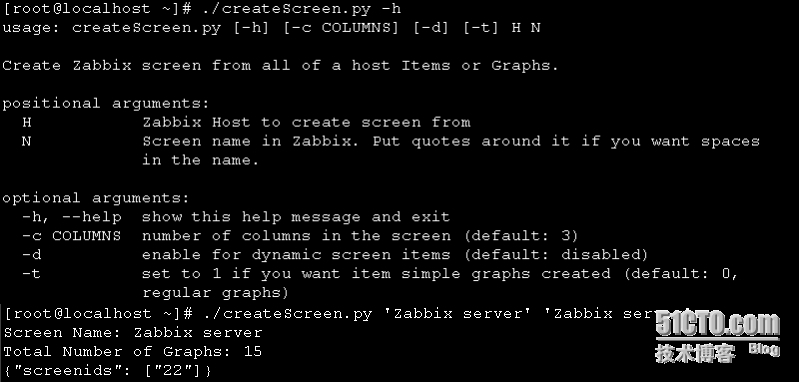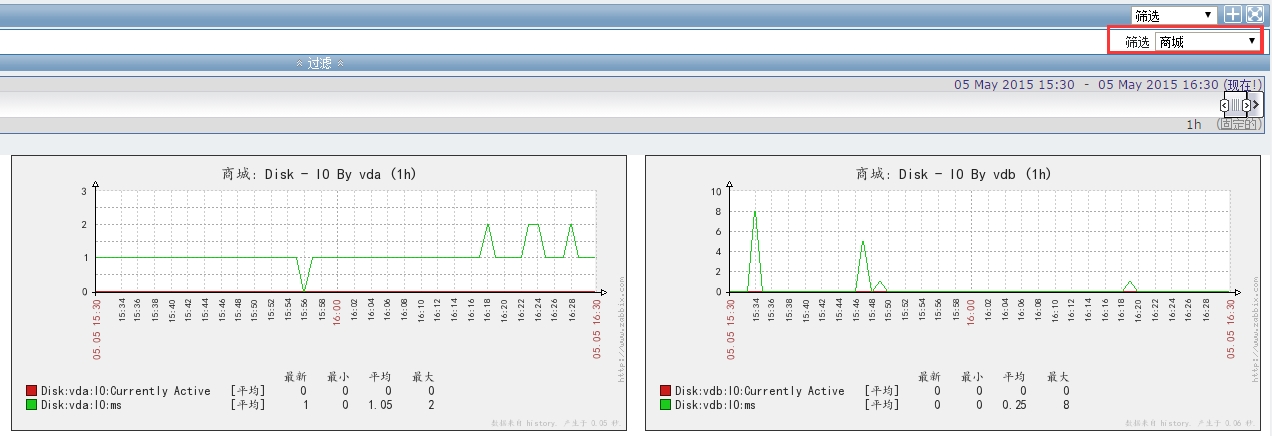zabbix创建screen脚本,通过bash脚本分析zabbix数据库实现服务器每日故障统计
http://qicheng0211.blog.51cto.com/3958621/1622152
下面是创建screen的脚本,可以把一个主机的所有graphs放在一个screen里查看。
#!/usr/bin/env python
import urllib2
import json
import argparse
def authenticate(url, username, password):
values = {'jsonrpc': '2.0',
'method': 'user.login',
'params': {
'user': username,
'password': password
},
'id': '0'
}
data = json.dumps(values)
req = urllib2.Request(url, data, {'Content-Type': 'application/json-rpc'})
response = urllib2.urlopen(req, data)
output = json.loads(response.read())
try:
message = output['result']
except:
message = output['error']['data']
print message
quit()
return output['result']
def getGraph(hostname, url, auth, graphtype, dynamic, columns):
if (graphtype == 0):
selecttype = ['graphid']
select = 'selectGraphs'
if (graphtype == 1):
selecttype = ['itemid', 'value_type']
select = 'selectItems'
values = {'jsonrpc': '2.0',
'method': 'host.get',
'params': {
select: selecttype,
'output': ['hostid', 'host'],
'searchByAny': 1,
'filter': {
'host': hostname
}
},
'auth': auth,
'id': '2'
}
data = json.dumps(values)
req = urllib2.Request(url, data, {'Content-Type': 'application/json-rpc'})
response = urllib2.urlopen(req, data)
host_get = response.read()
output = json.loads(host_get)
# print json.dumps(output)
graphs = []
if (graphtype == 0):
for i in output['result'][0]['graphs']:
graphs.append(i['graphid'])
if (graphtype == 1):
for i in output['result'][0]['items']:
if int(i['value_type']) in (0, 3):
graphs.append(i['itemid'])
graph_list = []
x = 0
y = 0
for graph in graphs:
graph_list.append({
"resourcetype": graphtype,
"resourceid": graph,
"width": "500",
"height": "100",
"x": str(x),
"y": str(y),
"colspan": "0",
"rowspan": "0",
"elements": "0",
"valign": "0",
"halign": "0",
"style": "0",
"url": "",
"dynamic": str(dynamic)
})
x += 1
if x == columns:
x = 0
y += 1
return graph_list
def screenCreate(url, auth, screen_name, graphids, columns):
# print graphids
if len(graphids) % columns == 0:
vsize = len(graphids) / columns
else:
vsize = (len(graphids) / columns) + 1
values = {"jsonrpc": "2.0",
"method": "screen.create",
"params": [{
"name": screen_name,
"hsize": columns,
"vsize": vsize,
"screenitems": []
}],
"auth": auth,
"id": 2
}
for i in graphids:
values['params'][0]['screenitems'].append(i)
data = json.dumps(values)
req = urllib2.Request(url, data, {'Content-Type': 'application/json-rpc'})
response = urllib2.urlopen(req, data)
host_get = response.read()
output = json.loads(host_get)
try:
message = output['result']
except:
message = output['error']['data']
print json.dumps(message)
def main():
# 修改下面三行
url = 'http://<zabbix url>/zabbix/api_jsonrpc.php'
username = "Your API Users Username"
password = "Your API Users Username"
parser = argparse.ArgumentParser(description='Create Zabbix screen from all of a host Items or Graphs.')
parser.add_argument('hostname', metavar='H', type=str,
help='Zabbix Host to create screen from')
parser.add_argument('screenname', metavar='N', type=str,
help='Screen name in Zabbix. Put quotes around it if you want spaces in the name.')
parser.add_argument('-c', dest='columns', type=int, default=3,
help='number of columns in the screen (default: 3)')
parser.add_argument('-d', dest='dynamic', action='store_true',
help='enable for dynamic screen items (default: disabled)')
parser.add_argument('-t', dest='screentype', action='store_true',
help='set to 1 if you want item simple graphs created (default: 0, regular graphs)')
args = parser.parse_args()
hostname = args.hostname
screen_name = args.screenname
columns = args.columns
dynamic = (1 if args.dynamic else 0)
screentype = (1 if args.screentype else 0)
auth = authenticate(url, username, password)
graphids = getGraph(hostname, url, auth, screentype, dynamic, columns)
print "Screen Name: " + screen_name
print "Total Number of Graphs: " + str(len(graphids))
screenCreate(url, auth, screen_name, graphids, columns)
if __name__ == '__main__':
main()
脚本使用方法:
[root@monitor sbin]# ./screen.py -h Traceback (most recent call last): File "./screen.py", line 4, in <module> import argparse ImportError: No module named argparse
解决方法:安装suricatasc
[root@localhost ~]# rpm -qa python python-2.6.6-36.el6.x86_64 [root@localhost ~]# suricatasc Traceback (most recent call last): File "/usr/bin/suricatasc", line 18, in <module> import argparse ImportError: No module named argparse # tar -xf argparse-1.3.0.tar.gz # cd argparse-1.3.0 # python setup.py install Traceback (most recent call last): File "setup.py", line 3, in <module> from setuptools import setup, find_packages ImportError: No module named setuptools 没有setuptools的模块,说明python缺少这个模块,那我们只要安装这个模块即可解决此问题,下面我们来安装一下: # tar -xf setuptools-15.2.tar.gz # cd setuptools-15.2 # python setup.py build # python setup,py install 在重新安装 # cd argparse-1.3.0 # python setup.py install

这里的第一个zabbix server就是你的主机名或者主机IP地址 第二个zabbix server就是图像名称

效果图:

通过bash脚本分析zabbix数据库,实现服务器每日故障统计
boss要求每天晚上九点发送一条短信,至各部门总监的手机上,总结一天中所有服务器的错误统计,接到任务后,我分析了一下,通过zabbix的自带功能不太好实现,于是打算通过编写shell脚本来实现,
脚本简要说明:
通过sql语句,查询出events表中一天的所有警报,通过triggers表将警报分类,然后按分类放入相应的数组,最后通过公司的短信接口,发出统计短信。
----------------------------------------------------------------------------------------------------------------------------------------------
#!/bin/sh
### ## 版本:V0.2 2010-10-21 22:28 David.zhu
#------------------------------
## array1 普通信息
## array2 警告信息
## array3 一般问题
## array4 严重问题
## array5 灾难
#-----------------------------
now=`date +%s`
fix=`expr $now - 86400`
myconn="mysql -h 192.168.0.10 -uzabbix -pzabbix zabbix"
result=`${myconn}
-e "SELECT objectid FROM events WHERE value=1 AND objectid >10000
AND clock>=${fix} AND clock<=${now} ORDER BY clock DESC LIMIT
100" | grep -v "objectid"`
i=0
for trid in ${result};do
PRO=`${myconn}
-e "SELECT priority FROM triggers t WHERE ((t.triggerid BETWEEN
000000000000000 AND 099999999999999)) AND (t.triggerid IN(${trid}))"|
grep -v priority`
case $PRO in
1) array1[$i]=${PRO};;
2) array2[$i]=${PRO};;
3) array3[$i]=${PRO};;
4) array4[$i]=${PRO};;
5) array5[$i]=${PRO};;
*) error[$i]=${PRO};;
esac
i=`expr $i + 1`
done
message="服务器监控总结---灾难问题:${#array5[@]}个|严重问题:${#array4[@]}个|一般问题:${#array3[@]}个|警告信息:${#array2[@]}个|普通信息:${#array1[@]}个"
mobile=('138*****' '138*****' '138*****' '138*****')
for ((j=0;j<${#mobile[@]};j++));do
number=${mobile[${j}]}
/usr/local/zabbix/bin/sendsms_pro.php ${number} notitle ${message} | 2>&1
done
-----------------------------------------------------------------------------------------------------------------------------------------------
注:本脚本在zabbix 1.8.3版本上测试通过,其它版本未做过测试,sendsms_pro.php为我司的短信接口,如没有接口,可以使用linux fetion来实现。